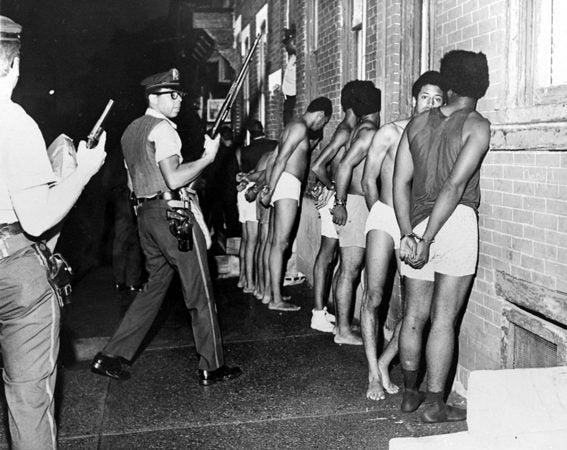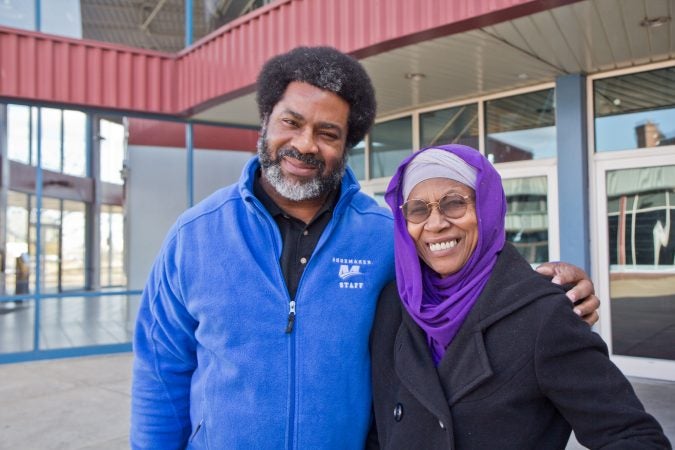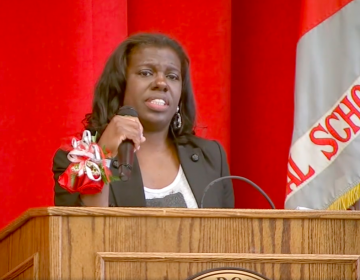‘Revolutionary’ principal goes all-in on quest for more black teachers
As the son of Black Panthers, Sharif El-Mekki grew up in West Philadelphia enraged at the injustice he saw all around him, including in education.

Sharif El-Mekki left his job as a principal in Southwest Philadelphia to start an organization which aims to recruit more African Americans into the teaching profession. (Kimberly Paynter/WHYY)
On a misty October Tuesday, Sharif El-Mekki sat in the gymnasium of a North Philadelphia elementary school that had been decked out with bright lights and sleek microphones. He sat in the next-to-last row, on the edge of his seat, as videographers darted around the room to record the event.
Tobias Harris, the Sixers’ star forward, was announcing to pep-rally-like fanfare the first nine organizations to be recognized by his philanthropy.
It was the Tobias Community Draft.
The organizations in line to receive money were told to show up, but not how much they would receive. El-Mekki waited as, one by one, in ascending order of amounts, Harris announced his choices.
He started at $25,000, rising to $50,000, then $75,000.
As names were announced, the amounts kept increasing — $100,000. $200,000. Soon, there was just one recipient left: The Center for Black Educator Development, an organization El-Mekki founded in June after 26 years as a teacher and principal in Philadelphia.
As lights flashed, Harris announced that the Center, or CBED, was his “top draft pick,” receiving $300,000 of the $1 million he gave out that day.
It was a huge coup for an organization that is only a few months old.
“I’m blown away,” El-Mekki said in accepting the symbolic oversized check.
El-Mekki has become a leading voice in the country advocating for the importance of diversifying the nation’s teaching force, which has become more white as the nation’s K-12 enrollment edges toward becoming majority students of color. He is traveling the country in a quest to entice young African Americans into teaching, telling them that they will be building on a proud history of black education and community leadership.
And he is working in a state that has one of the worst disparities between the demographics of its teaching force and its student population.
Across the country, according to the National Center for Education Statistics, 18 percent of teachers in the 2015-16 school year were nonwhite (its most recent data). And just 7 percent of teachers were African American, a share that’s declined. In 2000, 8 percent were black.
In Pennsylvania, as of 2018, less than 3 percent of teachers are African American, and barely 1 percent are African American males.
And while the Pennsylvania Department of Education has launched some initiatives to address the problem, the programs are small and must push against the fact that state support for higher education hasn’t recovered from cuts during the Great Recession of 2008.
This has pushed state schools, historically the largest supplier of teachers, to raise tuition rates, which puts more of an onus on families and particularly disadvantages students of color.
“I believe my calling is to support current and aspiring black educators,” El-Mekki said.
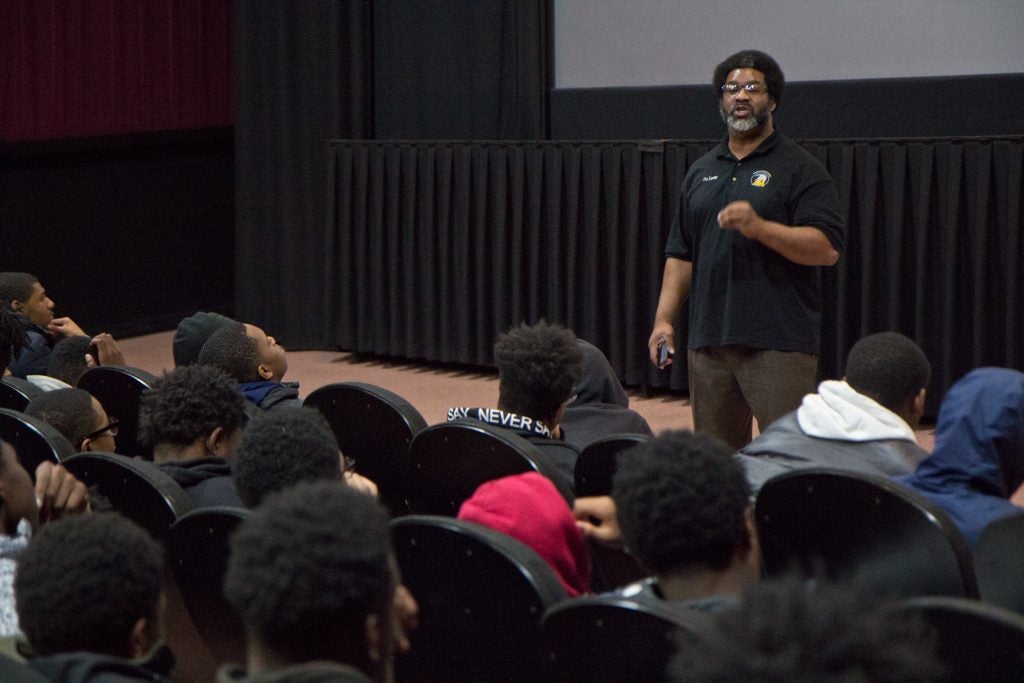
‘Not interested’
El-Mekki’s journey to teaching was an indirect one.
His mother and father, Hamid Khalid and Aisha El-Mekki, met and married in the late 1960s when they were both members of the Black Panther Party, based at the time in North Philadelphia and known for its activism, community service, and militant promotion of black self-reliance.
The group was targeted by J. Edgar Hoover’s FBI and Frank Rizzo’s police. El-Mekki’s father was among those arrested and jailed in infamous raids on party members in the summer of 1970 in which they were rousted out of their beds and forced to strip.
Steeped in this world, El-Mekki says he grew up in West Philadelphia enraged at the injustice he saw all around him, including in education. As a child, he attended Muslim schools, both here and abroad when his family moved for a time. He ultimately graduated from Overbrook High and enrolled at Indiana University of Pennsylvania on a scholarship.
He majored in criminal justice and knew he wanted to devote his career to righting the wrongs he saw around him. He figured he’d become a lawyer.
“I knew I wanted to be responsible for my community, how to serve, how to lead,” he said. “I thought it would be through the courtrooms.”
Then, a few weeks after graduation, he was playing pickup football on a playground in South Philadelphia. He made a particularly hard tackle. He explained, and later recounted in a story on The Moth Radio Hour: “In those days, quite I often channeled my rage through football. At some point I tackled someone really hard and I celebrated.”
Before he knew it, however, he turned around to a gun in his face: the recipient of his tackle got a weapon from friends who were watching the game.
In the ensuing struggle, El-Mekki was shot in the leg, severing an artery. It took multiple operations before he could walk again.
His experience made him more interested in working with young people in the criminal justice system. He got a job at the Youth Study Center, a job he figured he would do until he went to law school.
His best friend’s mother, Cynthia Moultrie, called him one day to suggest he might want to try teaching instead. The School District of Philadelphia was launching an initiative with the organization Concerned Black Men and was having meetings to recruit young people, including career changers.
“I told her that’s nice, but I’m not interested,” he recalled. “I questioned why she thought of me as I didn’t believe I had ever indicated to anyone I was even remotely interested in teaching.”
But out of respect for her, he agreed to attend one of the meetings
“I was fascinated how they described the impact you could have as a classroom teacher,” he said. “You could shape, mold and influence young people…This was something that would be challenging and fulfilling.”
And he started thinking about the young man who shot him.
“In my revolutionary training, I figured I would get shot by police. But the person who shot me looked like me.”
Where had his attacker’s life gone awry?
“Once I saw the impact and the connection between racial, social and educational justice, it became a no brainer for me.
“I said, ‘I am gonna do this.’ I became a teacher.”
‘Numbers don’t lie’
In choosing the Center for Black Educator Development for the top spot in their inaugural draft, Tobias Harris and his philanthropy team had done their homework. And they came to the conclusion that El-Mekki’s campaign for more black teachers has the best chance of making a big impact on the country’s persistent educational inequity. Harris, who signed a $180 million contract with the NBA team, is focusing his philanthropy on promoting childhood literacy and supporting the teaching profession.
“The numbers don’t lie,” the 6-foot-6-inch forward later explained.
The numbers he referred to are these: a study from Johns Hopkins University published by the National Bureau of Economic Research found that black students who have one black teacher by third grade are 13 percent more likely to enroll in college. Those who have more than one teacher who looks like them are 32 percent more likely to do so.
Previous research showed that having at least one black teacher in elementary school reduced by 29 percent the chances that low-income black students would drop out of high school. For black boys, it was 39 percent.
It was for this reason that El-Mekki reluctantly left his position as principal of Mastery Charter-Shoemaker Campus to establish the new organization, which among other strategies is setting up a pipeline for black educators by starting its recruitment efforts as early as possible.
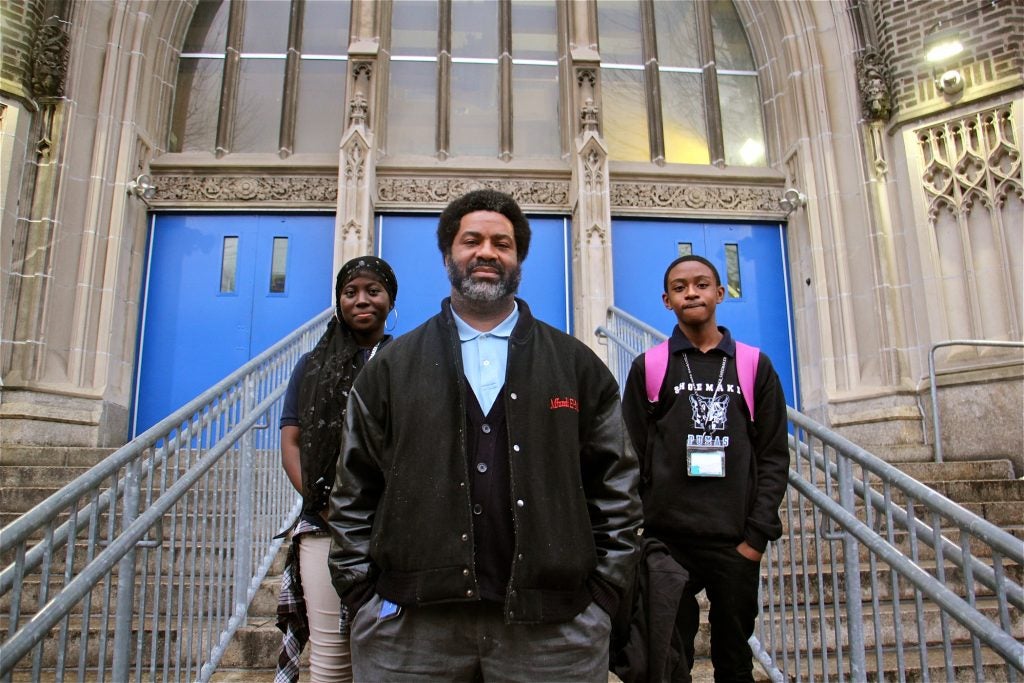
In working on this goal, El-Mekki notes that the demographic imbalance between public school students and teachers is particularly acute in Pennsylvania.
Philadelphia exemplifies the problem. Twenty years ago, more than a third of teachers in the city were African American. Today, that figure stands at about 24 percent. And only about 4 percent are men.
El-Mekki has spent his entire career as an educator in three schools located in the West Philadelphia neighborhood where he grew up, places, he said, that new teachers were counseled to avoid at the time by more seasoned veterans when they were just starting out.
He spent 10 years at Turner, a middle school at 59th and Baltimore that closed in 2013 (and is now the site of a KIPP charter school); Shaw, also closed; and Shoemaker, which the district turned over to Mastery in 2006, when it was considered the second most violent middle school in the city. El-Mekki became principal there in 2008.
“Each school I was in, I thought I’d never leave,” he said. “It is my honor to teach other people’s children.”
At Shoemaker and other places he worked, he says he always emphasized a holistic approach to education, developing “servant leaders” while emphasizing black identity, the quest for equality, and community-based projects.
“Social justice can’t be separated from education,” he said. “If it is, it is not really education.”
In 2014, he co-founded The Fellowship: Black Male Educators for Social Justice with the goal of doubling the number of black male educators in Philadelphia in five years, which was then about 350. Despite higher percentages of new hires being black males in recent years, the overall number in the city has risen only to 450.
The slow progress is one reason he founded the Center, which in addition to recruitment is also focusing on keeping teachers from leaving. Nearly 60 percent of teachers of all backgrounds leave the School District of Philadelphia within five years, according to data provided by school officials.
“I don’t believe as a city or a state we can realize our vision without addressing both recruitment and retention.”
El-Mekki’s work with the Center takes this mission national, broadens its scope, and makes it his full-time job.
“This was important enough work that it warranted far more of my attention,” he said, explaining why he gave up his day-to-day work in schools. “I thought I wanted to be part of a problem-solving team in the state and nationally to help address the issue. While a lot of people are talking about the issue, I didn’t see a lot of places concretely and deeply addressing it with real solutions.”
‘Troubling’ and ‘untenable’
The Center is tackling the issue from several angles: giving high school and college students exposure to teaching experiences, professional development for existing teachers, and efforts to influence policy on the state and federal level. It is holding workshops every other Wednesday this fall at Mary Bethune Elementary School in North Philadelphia. All teachers are invited, since the goal of CBED is not only to recruit more black teachers, but help all teachers improve cultural responsiveness and skills for teaching black children. Issues covered include strategies to improve student motivation and better manage classroom time.
For recruitment, the organization is using the Freedom School model, a staple of the civil rights movement that uses an intergenerational approach in which teens and young adults work with children on literacy skills and the arts through the lens of black pride and empowerment.
The state has launched some new initiatives, including an enhanced residency program at eight colleges, including Drexel, Indiana University of Pennsylvania, Penn State Harrisburg, and Millersvile, aimed at recruiting and supporting teachers of color while preparing them more specifically to work in urban environments.
Prospective teachers in these residencies “will have a year instead of the traditional semester in the classroom,” said Noe Ortega of the Pennsylvania Department of Education (PDE). The state is investing $4 million in that program.
PDE is also launching The Aspiring to Education initiative, or A2E, which is a statewide version of El-Mekki’s pipeline vision. It is spending about $4 million to expose students to teaching careers early, including a dual enrollment program that allows students to get college credits toward a teaching degree while still in high school.
Seventeen students from Mastery-Shoemaker are taking courses through Arcadia University as part of A2E.
In setting up the program, PDE conducted meetings across the state, starting in Philadelphia and Pittsburgh, at which El-Mekki was a key contributor.
But these new programs are small compared to disinvestment in the state’s higher education infrastructure that onlookers say has contributed to a stark reduction in the number of students from all backgrounds in the state preparing for education degrees.
A Keystone Crossroads analysis of state spending on higher education found the Great Recession-era budget cuts still have yet to be restored in many key line items.
A comparison of the 2008-09 and 2019-20 budgets shows an 11 % reduction in Pennsylvania higher education spending. Penn State University is receiving 20% less compared to before the recession. The University of Pittsburgh, Temple University and the schools in the state system of higher education (PASSHE) also are getting significantly less state funding comparatively.
The Pennsylvania Higher Education Assistance Agency (PHEAA), which gives tuition grants to qualifying students, has seen a 22% reduction in its funding.
This jibes with a national report released last month from the Center for Budget and Policy Priorities, a liberal-leaning think tank based in Washington, D.C.,which found states spending $6.6 billion less on higher education than a decade ago, translating to $1,200 less per student.
This puts more burden on families to pay tuition and particularly disadvantages low-income students of color – the very ones being targeted for teaching careers by the fledgling state programs and El-Mekki’s organization.
“Pennsylvania is one of only 6 states spending 30 percent below a decade ago,” said Mike Mitchell, who helped author the Center’s report. While per student funding for higher education has been on a slight upward trajectory over the last few years, “that is due to falling enrollment, not reinvestment.”
The report found that the net price of a public college education in Pennsylvania has risen to 34 percent of the state’s median household income. For black and Hispanic households, it is over 50 percent – making it largely prohibitive.
State Sen. Vincent Hughes called the situation “troubling” and “untenable,” especially when the state is trying to “drive more activity to get a more diverse teacher population.”
“One piece of research from our analysis has that for every $1,000 increase in tuition, there would be a reduction of 2.5 percent in minority enrollment,” he said. “There’s a problem overall attracting people to the teaching profession, and to get a large population of minority students and black and brown male students, you need to have an aggressive effort in that space.”
Overall, the number of students of any background seeking teaching degrees in Pennsylvania has fallen from around 14,000 annually to just over 4,400 in 2016-17. That is partly a consequence of this disinvestment and partly a consequence of the escalating demands on teachers, accompanied by relatively low pay compared to professions with similar degree requirements.
If students leave college with massive debt – and Pennsylvania ranks among the highest states there, too – Hughes says they are not likely to seek a career in education.
“The problem existing in the teaching profession for black and brown potential teachers is that the knowledge base [they get in college] can be utilized to go into other professions that pay a heck of a lot more,” Hughes said.
Exacerbating the problem in Pennsylvania is the particularly precarious conditions of both Lincoln and Cheyney Universities, among the nation’s oldest Historically Black Colleges and Universities (HBCUs), and traditionally a huge provider of black teachers. Both institutions have seen steep declines in enrollment and have struggled to remain financially viable.
“The hope is that we can possibly find some support to invigorate black and brown education programs to really address the pipeline,” said Hughes.
‘Revolutionary’
El-Mekki is undaunted, proceeding with his breakneck schedule, traveling the country, attending panel discussions and conferences, making speeches, and running special workshops for Philadelphia teachers. He blogs at Philly 7th Ward and is part of a four-member podcast team called the 8 Black Hands. (And he is maintaining his son’s beehives while he is away at Penn State.)
Often wearing a dashiki, El-Mekki combines his fierce and uncompromising activism with an open and friendly demeanor willing to accept help from anywhere. He is confident he can overcome all these obstacles, one step at a time, starting at the grassroots. One of the key components in building the pipeline is using the Freedom School model both for educator recruitment and the promotion of early literacy. CBED ran two of them last summer, one at Mastery-Cleveland and the other at Mastery Prep.
At these schools, students began each day with affirmations honoring ancestors because, said El-Mekki, “they are a manifestation of our dream and prayers.” Family, advocates and community leaders also visited to read to and with the students. The first through third graders participated in community service by designing a proposal to improve a playground, visiting retirement homes, and working on environmental projects.
Almost all the instructors were black high school and college students – most of them men —like Ramier Jones, a sophomore at Carver High School for Engineering and Science.
Right now, he thinks he might want to be an engineer.
In his own school career, at charter and district schools, Jones said, he has had both black and white teachers. “Having teachers of color is important,” he said. “For someone to look like you and know what you’ve been through, knowing that can make it way better.”
At the Freedom School, he was awed when he realized the impact he could have on the younger children. “Depending on what I do,” he said, “kids react and do the same thing.”
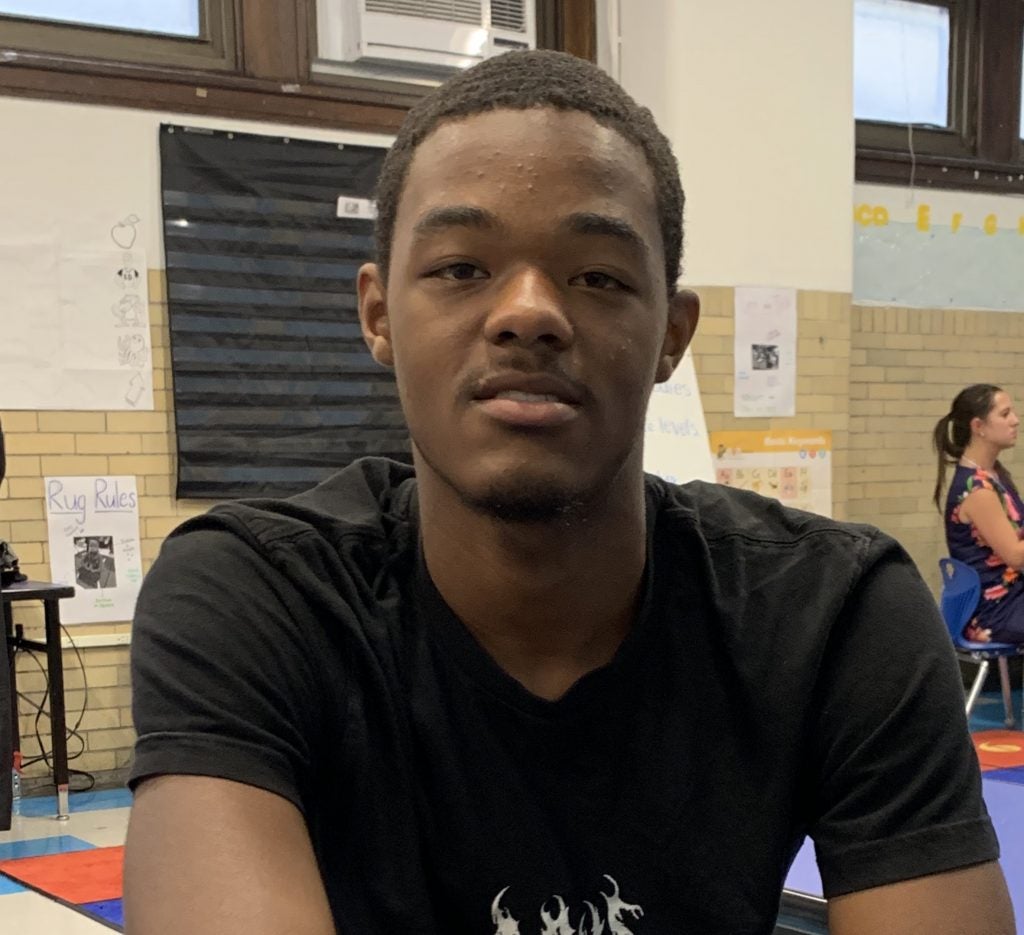
His summer experience got him thinking. “I love making components of a lesson personally geared to someone.” As a teacher, “I can act out a book, draw pictures, be more personal in the classroom. I learned that I like more things about teaching than I don’t like.”
Maybe, just maybe, he said, “I could see myself as a teacher of math or science.”
So far, including the bequest from Tobais Harris, El-Mekki has raised $950,000 for his organization. His goal is $1.4 million this fiscal year. Including himself, he has a staff of five people. The grant from Harris will allow CBED to double the number of Freedom Schools in summer 2020 from two to four.
In his story for The Moth, El-Mekki reflects on how, from childhood, he wanted to be a revolutionary. He admits, “I didn’t know how to be a revolutionary. Now, as a black man at a blackboard, I am a revolutionary.”
WHYY is your source for fact-based, in-depth journalism and information. As a nonprofit organization, we rely on financial support from readers like you. Please give today.




